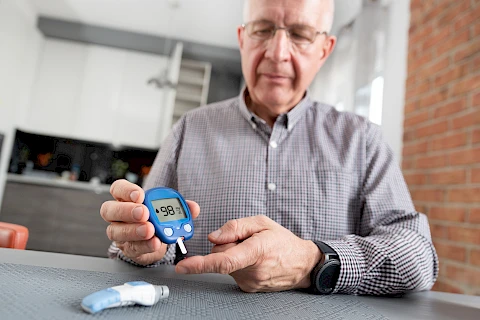
Diabetes can bring many challenges, and one of the most significant issues is eye health. Seniors with diabetes are at a higher risk of developing eye conditions that can lead to vision loss. With some tips in mind, caregivers can better manage diabetes-related eye concerns for their senior loved ones.
Diabetes-Related Eye Conditions
Seniors with diabetes are more likely to develop certain eye conditions. Understanding these conditions is the first step in managing them.
- Diabetic Retinopathy: Diabetic retinopathy refers to damage to the blood vessels in the retina. It can lead to vision problems and, if untreated, blindness.
- Diabetic Macular Edema: Diabetic macular edema occurs when fluid builds up in the macula, a part of the retina that helps with sharp vision. This can cause blurred vision or vision loss.
- Cataracts and Glaucoma: Diabetes increases the risk of cataracts and glaucoma. Cataracts cloud the eye's lens, while glaucoma damages the optic nerve, leading to vision loss.
Importance of Regular Eye Exams
Regular eye exams are pivotal for seniors with diabetes. They help detect problems early before they cause severe damage. Seniors with diabetes should have eye exams at least once per year. An eye exam usually includes checking for vision changes, measuring eye pressure, and dilating the pupils to examine the retina closely. Staying on top of these appointments and understanding the process can help you better support your loved one’s eye health.
Maintaining Stable Blood Sugar Levels
Keeping blood sugar levels stable is necessary for good eye health. Fluctuating blood sugar levels can lead to eye swelling, damaging blood vessels, and causing vision problems. Regularly check and keep a record of your senior loved one's blood sugar levels. Follow the doctor’s recommendations on diet, medication, and insulin use to maintain consistency.
Following a Healthy Lifestyle
A healthy lifestyle can help manage diabetes and reduce the risk of eye problems. A diet rich in fruits, vegetables, and whole grains can help stabilize blood sugar levels. Smoking and excessive drinking can worsen diabetes complications. Encourage your loved one to avoid these to improve their overall health.
Staying active can help manage diabetes. Seniors can benefit from at least 30 minutes of moderate exercise most days of the week. Just remember to consult their doctor before introducing a new fitness routine.
Resources for Diabetes Management and Education
Many communities offer diabetes education programs. These programs provide valuable information on managing diabetes. Websites like the American Diabetes Association offer a wealth of information. Online support groups can also provide emotional support and practical advice. There are apps and devices available to help track blood sugar levels, medication schedules, and diet. These tools can make managing diabetes easier.
Role of Caregivers in Supporting Seniors
Caregivers are crucial in managing seniors' diabetes-related eye concerns. They ensure their loved ones receive necessary care by tracking medical appointments and medication schedules. Caregivers can support seniors by encouraging healthy eating, regular exercise, and avoiding harmful habits like smoking. They also provide emotional support, helping seniors stay committed to managing their condition effectively.
Get Assistance With Diabetes Care From Senior Helpers
Managing diabetes-related eye concerns is integral to maintaining quality of life. Your commitment and proactive approach can help preserve the vision and overall health of your senior loved one.
If you need assistance caring for a senior loved one in Chicago, River Grove, Harwood Heights, Melrose Park, and Schiller Park, we can help. Senior Helpers Elmwood Park offers professional in-home support, including diabetes care and other chronic conditions. Contact us to explore your options!